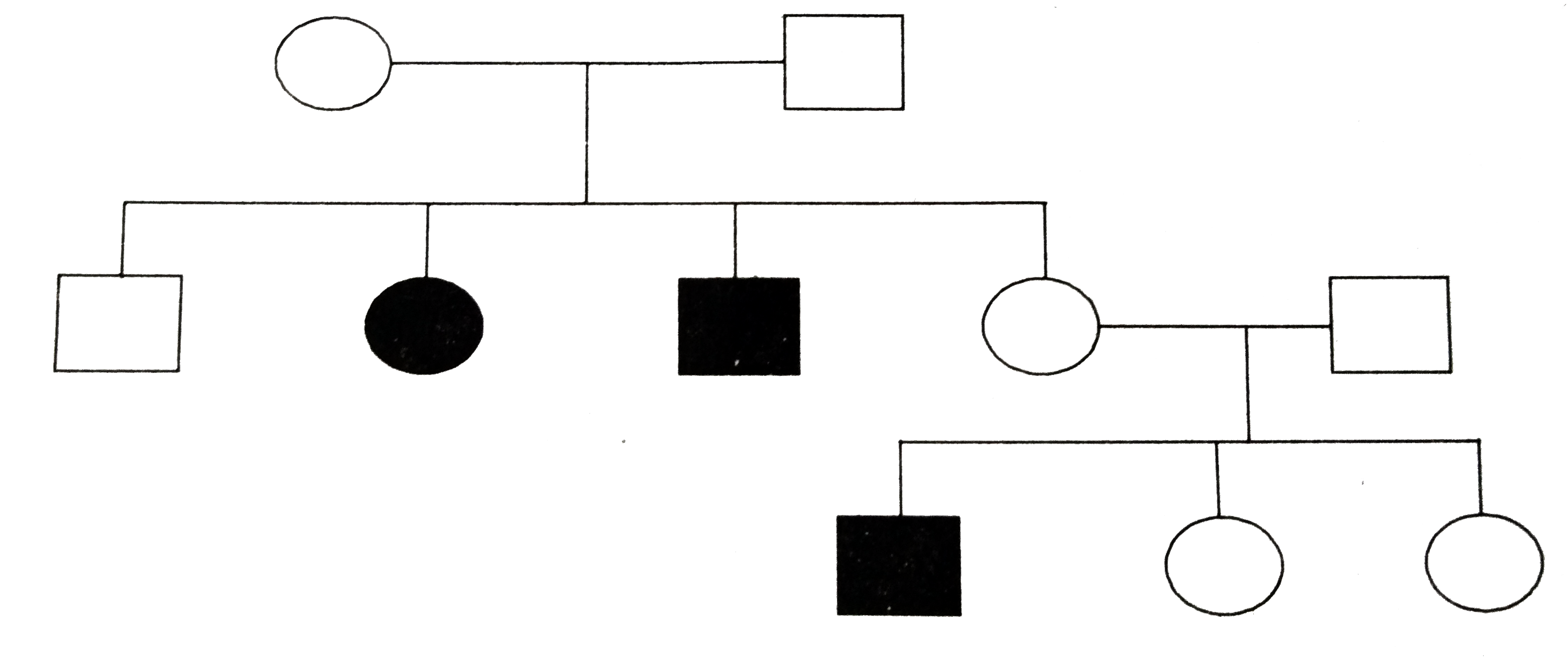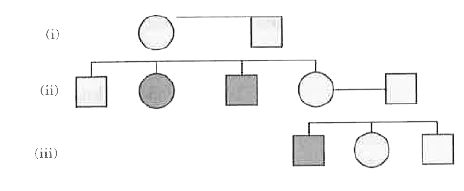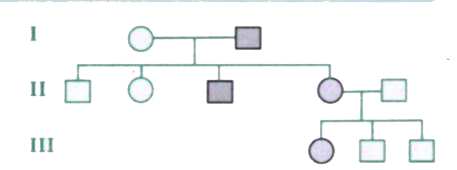Study the given pedigree chart and answer the questions that follow.

Give the genotypes of the parents shown in generation I and their child shown in generation II and the first grandchild shown in generation III.Solution in Punjabi
Parents, Mother-aa
Father-Aa
Third child-Aa
First grand child-Aa
Topper's Solved these Questions
- BOOK - BETTER CHOICE PUBLICATIONCHAPTER - PRINCIPLES OF INHERITANCE AND VARIATION EXERCISE - SHORT ANSWER TYPE QUESTIONS66videos
PRINCIPLES OF INHERITANCE AND VARIATION
- BOOK - BETTER CHOICE PUBLICATIONCHAPTER - PRINCIPLES AND PROCESSES IN BIOTECHNOLOGY EXERCISE - LONG ANSWER TYPE QUESTIONS16videos
PRINCIPLES AND PROCESSES IN BIOTECHNOLOGY
- BOOK - BETTER CHOICE PUBLICATIONCHAPTER - REPRODUCTION IN ORGANISMSEXERCISE - LONG ANSWER TYPE QUESTIONS (5 MARKS)11videos
REPRODUCTION IN ORGANISMS
Similar Questions
Who is responsible for the sex of the new born child. Male or Female? Explain.
05:25View SolutionWhat is recombinant DNA technology? Explain in brief the various steps in the process of recombinant DNA technology.
05:25View SolutionExplain various artificialmethods of vegetative propagation.
05:35View SolutionStudy the given pedigree chart and answer the queation that follow.

(a) In the trait recessive or dominant ?
(b) Is the trait sex-linked or autosomal ?
(c) Give the genotypes of the parants in generation I and of their third and fourth child in generation.02:25View SolutionStudy the given pedigree chart and answer the queation that follow. (a) In the trait recessive or dominant ? (b) Is the trait sex-linked or autosomal ? (c) Give the genotypes of the parants in generation I and of their third and fourth child in generation.
02:43View SolutionStudy the given pedigree chart showing the pattern of blood group inheritance in a family (a) Given the genotype of the following: (i)Parents (ii) The individual 'X' in second generation (b) State the possible blood groups of the individual 'Y' in third generation (c) How does the inheritance of this blood group explain codominance?
06:13View SolutionStudy the given pedigree chart and answer the questions that follow (i) Trait is autosomal recessive (True/False) (ii) Give the genotype of the members 3 and 4.
03:01View SolutionStudy the given pedigree chart for sickle-cell anaemia and select the most appropriate option for the genotypes of parents , 1st child and 3rd child in F1 generation respectively .
 09:22View Solution
09:22View SolutionStudy the given pedigree chart and answer the questions that follow.

Is the trait recessive or dominant?
Is the trait sex linked or autosomal?
Give the genotypes of the parents in generation I and their third and fourth child in generation II.05:52View SolutionStudy the given pedigree chart and answer the questions that follow. Is the trait recessive or dominant? Is the trait sex linked or autosomal? Give the genotypes of the parents shown in generation I and their III child shown in generation II and the first grandchild shown in generation III.
04:27View SolutionStudy the given pedigree chart and answer the queation that follow.

(a) In the trait recessive or dominant ?
(b) Is the trait sex-linked or autosomal ?
(c) Give the genotypes of the parants in generation I and of their third and fourth child in generation.05:35View SolutionStudy the given pedigree chart and answer the question that follow. (a) In the trait recessive or dominant ? (b) Is the trait sex-linked or autosomal ? (c) Give the genotypes of the parents in generation I and of their third and fourth child in generation.
03:06View SolutionStudy the given pedigree chart and answer the queation that follow.

(a) In the trait recessive or dominant ?
(b) Is the trait sex-linked or autosomal ?
(c) Give the genotypes of the parants in generation I and of their third and fourth child in generation.03:58View SolutionStudy the given pedigree chart and answer the following question: Give the genotypes of Parents in generation I that is 3rd and 4th child in generation I
04:14View SolutionStudy the given pedigree chart showing the pattern of blood group inheritance in a family (a) Given the genotype of the following: (i)Parents (ii) The individual 'X' in second generation (b) State the possible blood groups of the individual 'Y' in third generation (c) How does the inheritance of this blood group explain codominance?
04:45View SolutionStudy the given pedigree chart and answer the following questions:

Give the genotypes of the parents shown in generation I and their third child shown in generation II and first grand child shown in generation III.03:00View Solution

